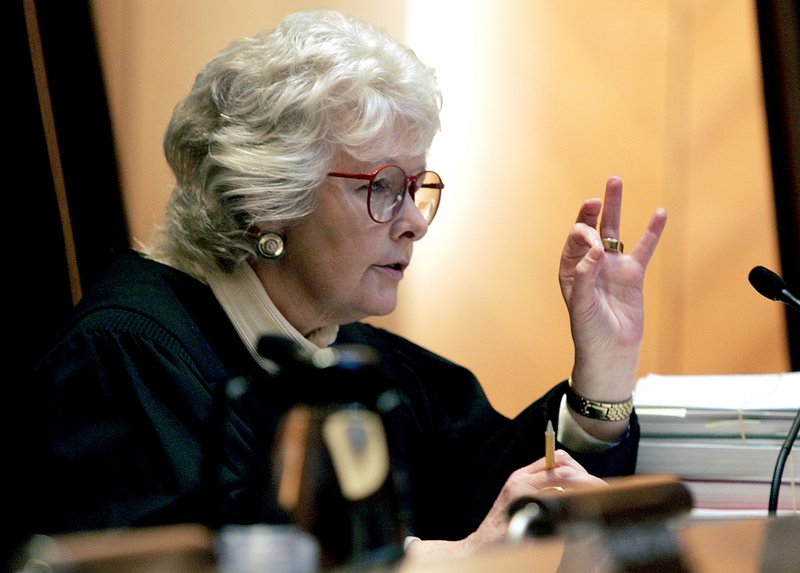BOSTON – Margaret Marshall’s decision to retire as chief justice of the Massachusetts Supreme Judicial Court gives Gov. Deval Patrick a unique election-year opportunity.
He not only gets to make a third appointment to the seven-member panel, but the Democrat could leave a lasting legacy — whether he wins or loses re-election in November — through his pick to run the state’s highest court.
One of the chief justice’s most important powers is the authority to assign which colleague writes the court’s majority opinion. Marshall reserved it for herself in 2003, when the court narrowly decided to make Massachusetts the first state in the country to legalize gay marriage.
“When you’re a governor, the people you appoint to the judiciary are there long after you’re gone. So, particularly at the SJC level, those are significant appointments,” said former Gov. Paul Cellucci, who appointed four justices and elevated Marshall, making him the last governor to name a chief justice.
Beyond holding sway over the court’s deliberations, the chief justice also serves a crucial role in state government: He or she leads the judicial branch of government, the third among equals with the executive and legislative branches. The responsibilities not only extend to the Supreme Judicial Court itself, but the appeals and trial court systems.
They include the District and Superior courts, as well as the housing, probate and land courts.
“It’s like being the governor or the Senate president and House speaker; you run a branch of government,” said Len Lewin, who ran Cellucci’s search process as the governor’s chief legal counsel. “You need a person who understands the process, the camaraderie on the bench, the administrative responsibilities.”
Patrick, a liberal who graduated from Harvard Law School, already has appointed Margot Botsford and Ralph Gants to the SJC. Each time he searched for a new justice, he said he was seeking not only a brilliant legal mind, but also someone with “empathy for people” or “an understanding of the human condition.”
Legal experts say there is no slam-dunk SJC appointee sitting in the lower court system but an array of talented judges. Likewise, they said there is no sure bet for chief justice, though the governor’s admiration for Botsford was palpable.
There is no specific court calendar in Massachusetts, as there is with the U.S. Supreme Court starting its sessions the first Monday in October, but Marshall said in her retirement announcement she will step down by the end of October if she is not replaced beforehand.
If the Patrick administration follows the selection process it used to appoint Botsford and Gants, it will seek applications to the Judicial Nominating Commission. That independent panel of legal experts will review the applicants’ backgrounds and writings, and then conduct interviews. Afterward, it will recommend a slate of finalists. Patrick picked both of his justices from those respective slates.
The nominee must then be confirmed by the Governor’s Council, a nine-member panel of elected officials presided over by Lt. Gov. Timothy Murray.
With the chief justice leaving, though, Patrick can follow several replacement scenarios.
He could make a single appointment to the court, directly replacing Marshall with a newcomer designated to serve as chief justice. Legal experts say such a maneuver can infuse a court with fresh thinking and avoid dissension between those justices who feel slighted and the one elevated to be chief.
The governor could also make a pair of appointments, elevating a sitting justice to chief, and then nominating a second person to be one of the six remaining associate justices. Legal experts say that maneuver allows a governor to deepen his control over the bench, both by dictating its leader and adding to its membership.
The risk is not one but two confirmation processes, since both appointments would have to be vetted by the Judicial Nominating Commission and confirmed by the Governor’s Council.
William “Mo” Cowan, the governor’s chief legal counsel, said he learned of Marshall’s retirement only hours before she announced it Wednesday, so the administration has not yet settled on a replacement strategy.
Yet while noting a newcomer could be named chief, Cowan said: “All due consideration must be given to the esteemed members who already sit on the court.”
Copy the Story Link
Send questions/comments to the editors.



Success. Please wait for the page to reload. If the page does not reload within 5 seconds, please refresh the page.
Enter your email and password to access comments.
Hi, to comment on stories you must . This profile is in addition to your subscription and website login.
Already have a commenting profile? .
Invalid username/password.
Please check your email to confirm and complete your registration.
Only subscribers are eligible to post comments. Please subscribe or login first for digital access. Here’s why.
Use the form below to reset your password. When you've submitted your account email, we will send an email with a reset code.